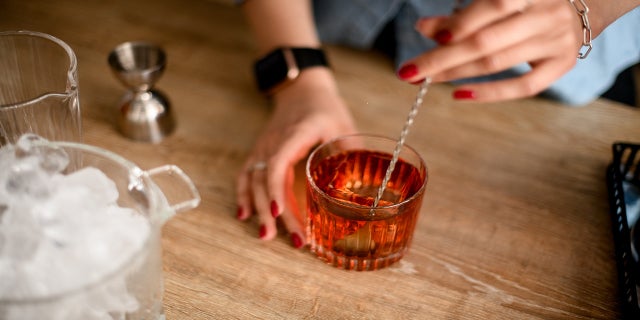
Eric Shawn: Masked confusion. What should you do?
Dr. Amesh Adalja of Johns Hopkins clearing up the CDC guidelines on who should wear masks against COVID-19
With about 38% of the U.S. population fully vaccinated, or some 126 million Americans, some question whether it’s safe to enjoy a celebratory cocktail shortly after receiving the jab.
“It is perfectly fine to have a single drink!” Dr. Gregory Poland, director of Mayo Clinic’s vaccine research unit, told Fox News. Other experts agreed, including Dr. Dean Winslow at Stanford University Medical Center, though they offered up one caveat: “Everything in moderation.”
Some experts note excessive drinking may exacerbate potential side effects looming after vaccination.
“Vaccine side effects include muscle aches and pains and feeling under the weather. Compounding that with the side effects of alcohol runs the risk of making you feel worse,” Dr. Tania Elliott, clinical instructor of medicine at NYU Langone Health, told Health.

Experts say it’s OK to consume alcohol in moderation after receiving a COVID-19 vaccine (iStock).
“One cocktail after a vaccine shouldn’t affect the efficacy of the vaccine, although this hasn’t officially been studied,” Dr. Annabelle de St. Maurice, co-chief infection prevention officer and assistant professor of pediatric infectious diseases at UCLA, wrote in an email to Fox News. “We know that the vaccines have been effective in clinical trials and in the real world. Likely many of these people may have had some alcohol around the time they received the vaccine, yet it was still effective. In other words, if you want to celebrate your new vaccine-induced immunity with a cocktail it’s likely OK to do so.”
Indeed, one of the investigators on Moderna’s COVID-19 vaccine trial, Dr. Hana El Sahly, previously told Healthline that alcohol consumption wasn’t studied as a variable during the late-stage clinical trial.
“We do not expect that occasional or moderate amount of alcohol ingestion to affect the response to the vaccine,” El Sahly, associate professor of molecular virology and microbiology and medicine at Baylor College of Medicine, told the news outlet. “And we are not requesting from subjects or the general public to abstain from alcohol around vaccination time.”
However, one too many drinks may become an issue.
Aside from a number of other health harms, consistent heavy drinking can weaken the immune system, according to the Mayo Clinic. The Centers for Disease Control and Prevention defines heavy drinking as 15 or more drinks per week for men and 8 or more drinks per week for women. According to Dr. Stuart Ray, professor of medicine at Johns Hopkins, “it’s not entirely certain” how the COVID-19 vaccine response might be affected for heavy drinkers.
“People with alcoholism are likely to be susceptible to severe complications of COVID-19, so getting them vaccinated is a priority,” Ray told Fox News. “Of course, having them reduce alcohol intake and improve nutrition has many potential benefits, and improving response to the COVID-19 vaccine might be one of them.”
Source: Read Full Article
